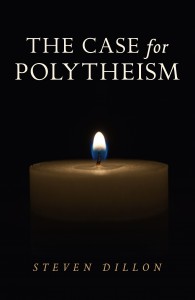

Extracted from The Case for Polytheism by Steven Dillon
An Argument for Polytheism
- If gods have been perceived, then polytheism is true.
- Gods have been perceived.
- Therefore, polytheism is true.
Explanation and Defense
This simple and straightforward argument is logically valid. As is customary then, we’ll focus on appraising its premises. Fortunately, there are only two of them.
Premise (1): If gods have been perceived, then polytheism is true.
Recall that a perception is a perceptual experience that is caused by the object it represents there to be. Thus, a god is perceived just in case there is a god that causes someone to have a perceptual experience of it. As such, if more than one god has been perceived, then there is more than one god, as they have caused people to have perceptual experiences of them. And the existence of more than one god is precisely what polytheism declares. I take it that this premise is indisputable.
Premise (2): Gods have been perceived.
I argued above that it is reasonable to trust a perceptual experience unless and until we have good reason not to. It follows that if people have had perceptual experiences of gods, then it is reasonable to trust those experiences unless and until we have good reason not to. My first goal then is to show that people have indeed had perceptual experiences of gods. For many of us, this will be all that is needed to show that premise (2) is true, for we lack good reasons to doubt these perceptual experiences (even if we find them hard to believe, a sensation that does not actually constitute an objection). However, some do take themselves to have good objections to these perceptual experiences, and therefore, I will turn to those next and investigate whether any are successful.
So then, has it ever actually seemed to anyone that a deity was present? Well, one thing is for sure — many, many people have claimed as much:
The experience included a sublime consciousness of a personalized sustaining power which defies description. I recall wondering whether I had found God or had God found me. I was infinitely more concerned with and aware of people and my environment. Mental perception and originality of thought were heightened. Living reached undreamed of levels of sheer joy….I was at first surprised to discover little correlation between my experience and the Church’s beliefs and behavior.But the more I seek words to express this intimate intercourse, the more I feel the impossibility of describing the thing by any of our usual images. At bottom the expression most apt to render what I felt is this: God was present, though invisible, he fell under no one of my senses, yet my consciousness perceived him.
Dr. Eben Alexander has recently published the book Proof of Heaven. The book is essentially his medical analysis — as a professional neurosurgeon — of an experience he had while his neo-cortex was inoperative for about a week. During his ‘Near Death Experience’, Dr. Alexander took himself to perceive a god whom he calls ‘Aum’ (because of the sound it seemed to generate). It is then quite uncontroversial that people have claimed to perceive deities.
Now the question arises, is there any good reason to doubt that these people have really had these perceptual experiences? I submit that it is reasonable to trust that things are as others report them to be unless and until we have good reason not to. Almost all of our knowledge is based on this sort of trust. For instance, I haven’t the time or ability to check the historical claims of my chemistry text book (by repeating experiments and so forth). I just have to trust. I similarly trust testimonials from news reporters as well as memories of what gas prices used to be like, or humorous childhood anecdotes. When the weather man tells me how likely it is to rain, I trust. Reflecting a little on the amount of our knowledge that is based on the testimony of others reveals not only that we really should trust testimony in the absence of good defeaters, but that we don’t trust other’s testimony because of their credentials (how many of our family members who have taught us so much lack university degrees altogether?).
The German philosopher Immanuel Kant observed something very interesting about language. Why do you think lying works? Isn’t that a strange phenomenon? We’re able to lie to others, or deceive them into thinking that something false is actually true because we’re expected to tell the truth! If everyone (or most people) lied, we wouldn’t trust each other and lying wouldn’t work. I don’t feel, therefore, that I’m asking anyone to embrace a fringe epistemic practice: initially trusting others is the status quo.
In contrast to the view that beliefs based on testimony are inferential, renowned epistemologist Robert Audi says this:
[B]eliefs about the credibility of the attester and beliefs pertinent to the attested proposition play a mainly filtering role: they prevent our believing testimony that does not ‘pass’, for instance because it seems insincere; but if no such difficulty strikes us, we ‘just believe’ (non-inferentially) what is attested. These filtering beliefs are like a trap door that shuts only if triggered. Its normal position is open, but it stays in readiness to block what should not enter. The open position is a kind of trust.
The foregoing is intended to show that we should trust the claim that people have had perceptual experiences of deities unless and until we have good reason not to. In other words, the claim under investigation should be regarded as innocent until proven guilty. Such trust is normal and reasonable. No doubt, some folks will make claims like these for attention, credibility, or out of confusion and so forth. But given that most of us have not even heard the majority of such testimonials, we are hardly in a position to judge them as so problematic.
As noted above, for many of us, the foregoing will be all that is needed to justify premise (2). Once those of us who have no good reason to reject all perceptual experiences of gods as unreliable admit that people have had such experiences, we’re committed to the accuracy of such experiences. I invite the reader to truly reflect on whether she has good reasons to think that all perceptual experiences of gods are unreliable. What could give someone such an insight into these experiences?
The Case for Polytheism, published by Iff Books February 2015
- eBook £4.99 || $7.99
- Feb 27, 2015. 978-1-78279-734-0.
- BUY | AMAZON US | AMAZON UK
- Paperback £7.99 || $11.95
- Feb 27, 2015. 978-1-78279-735-7.
- BUY | AMAZON US | AMAZON UK
| Follow this author |
  |
Categories:
0 comments on this article







